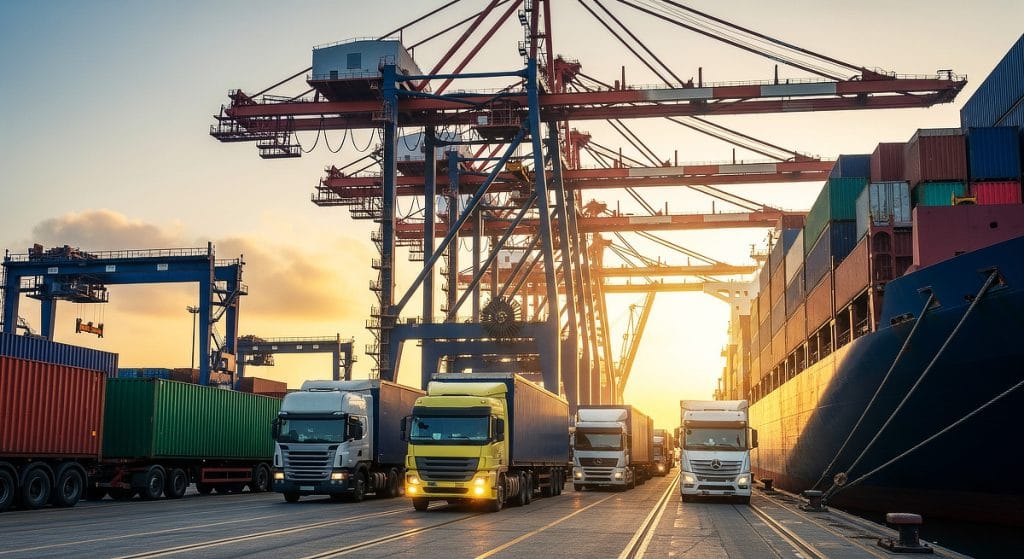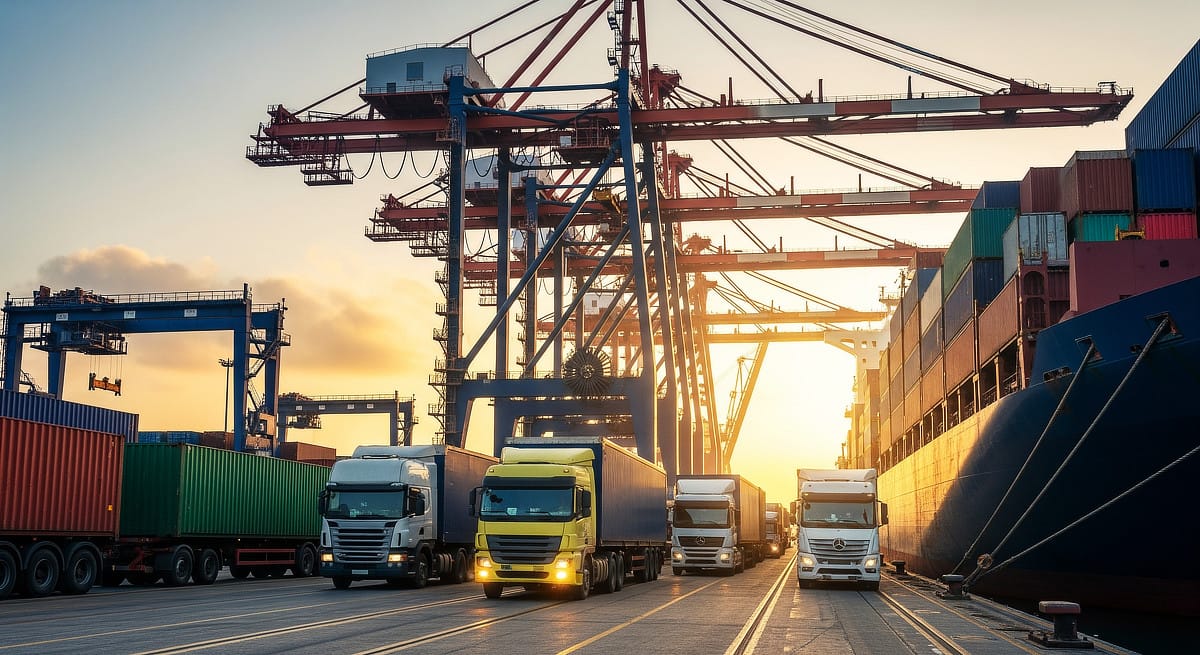Introduction: Demystifying the Middleman of Global Trade
Every product on a shelf, every shipment on a vessel, every container on a train somewhere in its journey – a freight forwarder has played a vital role.
Global trade is vast, worth over $30 trillion annually, and it continues to expand despite disruptions, shifting regulations, and geopolitical headwinds. For businesses large and small, getting goods across borders isn’t just about transport; it’s about managing a minefield of rules, paperwork, and schedules.
The stakes are high. A misfiled document can strand cargo at a port for weeks. A missed deadline can cost a seasonal retailer its entire sales window. An overlooked regulation can result in substantial fines. These are problems that even the most ambitious exporters cannot afford to get wrong.
That’s where freight forwarding comes in. Forwarders are the quiet, methodical engineers of global movement. They may not own the vessels, planes, or trains, but they orchestrate the entire journey, ensuring goods move not only from point A to point B, but also across the dozens of checkpoints in between.
What Exactly Is Freight Forwarding?
At its core, freight forwarding is the coordination and management of international shipments on behalf of shippers. But that description undersells the role.
Freight forwarders act as the architects of global supply chains. They plan the journey, book cargo space, handle the paperwork, liaise with customs officials, and arrange insurance. They ensure each link in the chain connects seamlessly.
Unlike carriers who focus only on their own leg of the journey, forwarders are responsible for the big picture. They align multiple carriers across modes and borders to create a single, continuous flow of goods. And they do it while balancing cost, time, and compliance.
In an era when supply chains stretch across continents and time zones, this role has never been more critical.
A Short History of Freight Forwarding
Freight forwarding has roots going back centuries. In 19th-century Europe, shipping agents helped merchants arrange safe passage for goods by sea and rail. These agents handled the early forms of documentation, negotiated with carriers, and acted as intermediaries in foreign ports.
The modern freight forwarder began to take shape with the advent of containerisation in the 1960s. Standardised containers revolutionised global trade by allowing goods to move seamlessly between ships, trains, and trucks. Forwarders evolved alongside this change, managing multimodal transport and ensuring goods stayed on schedule.
In the 2000s, digitalisation added another layer of sophistication. Tracking systems, electronic data exchange, and real-time platforms allowed forwarders to give clients visibility over their cargo. Today, the industry continues to evolve using AI, blockchain, and analytics to handle complexity at a global scale.
What started as simple shipping agents are now strategic partners in world trade.
The Core Services of a Freight Forwarder
Behind every successful shipment is a forwarder quietly managing dozens of moving parts. Their job is not just to find cargo space, but to ensure each detail lines up to create a seamless journey.
A reputable freight forwarder typically provides:
- Route Planning & Carrier Selection – Identifying the most efficient and cost-effective transport options, negotiating with multiple carriers to secure capacity.
- Documentation Management – Preparing bills of lading, commercial invoices, and certificates of origin — paperwork that forms the backbone of international trade.
- Customs Clearance – Navigating import/export regulations, tariffs, and duties, ensuring shipments avoid costly demurrage or detention.
- Cargo Insurance – Offering protection against loss, theft, or damage, giving businesses peace of mind that their goods are covered.
- Warehousing & Consolidation – Providing storage and combining shipments for smaller exporters to reduce costs.
- Multimodal Transport – Coordinating road, rail, sea, and air into one unified supply chain.
These services remove friction, allowing companies to focus on markets and customers rather than chasing paperwork or dealing with disruption.
Why Businesses Choose Freight Forwarders
The decision to work with a freight forwarder often comes down to a simple calculation: risk vs reward.
Companies that try to handle international shipping on their own often face hidden costs, compliance challenges, and operational delays. A forwarder mitigates those risks and adds measurable value.
Here’s why businesses rely on them:
- Efficiency – Optimised routes save time and avoid unnecessary costs. A forwarder can combine shipments, reroute around congestion, and negotiate better rates.
- Expertise – Regulations differ from country to country. Forwarders have the knowledge to avoid mistakes that stall shipments at borders.
- Risk Management – From insurance to contingency planning, forwarders safeguard against disruption.
- Scalability – As businesses grow, forwarders adjust capacity, whether moving one container or 50.
- Global Reach – Networks of agents and partners across ports and countries ensure shipments never get stuck in unfamiliar territory.
For many exporters and importers, forwarders are less a vendor and more a strategic ally who makes global trade feasible.
Common Challenges in Freight Forwarding
Even with the best planning, global logistics is unpredictable. Forwarders exist because trade comes with risks that no single company can fully control.
Some of the most common challenges include:
- Port Congestion – Delays caused by bottlenecks, particularly during peak seasons.
- Documentation Errors – A single mistake on a bill of lading can hold cargo for weeks.
- Shifting Regulations – From Brexit to new customs codes, rules can change overnight.
- Carrier Shortages – During demand spikes, space on vessels and planes becomes scarce.
- Rising Costs – Fuel surcharges, container shortages, and geopolitical tensions push freight rates upward.
Events like the Suez Canal blockage or pandemic-era port congestion show how fragile global supply chains can be. The difference lies in preparation: the best forwarders anticipate disruptions and build alternatives before they happen.
Technology & the Future of Freight Forwarding
The industry is changing. Today’s forwarders aren’t only experts in logistics; they’re also tech-driven partners offering digital solutions.
- Real-Time Visibility – Digital platforms allow shippers to track cargo from port to port, reducing uncertainty.
- AI-Powered Forecasting – Algorithms predict delays, optimise routes, and flag risks before they escalate.
- Blockchain for Documentation – Secure, digital records reduce fraud and eliminate paperwork bottlenecks.
- Sustainability & Green Corridors – Forwarders are leading shifts toward lower-emission transport, using rail over road and optimising container loads to cut carbon.
The future of freight forwarding lies in combining expertise with data — a blend of human judgement and digital precision.
Freight Forwarding vs. Shipping Lines
A common misconception is that booking directly with a shipping line is simpler. But the two roles serve different purposes.
- Shipping lines own and operate vessels, moving cargo from port to port.
- Freight forwarders design and manage the entire journey — across carriers, modes, and borders.
If the shipping line is the engine, the freight forwarder is the navigator. One provides power; the other provides direction. Businesses need both, but it is the forwarder who ensures the cargo arrives as promised.
Confidex: Precision in Motion
At Confidex, freight forwarding isn’t just a service — it’s a solution engineered for the realities of modern trade.
- Baltic Precision, Global Scale – Based in Riga, we connect Europe to the world with accuracy and reliability.
- Multimodal Expertise – From rail and road to sea freight and flexitank solutions for liquid cargo, we tailor each movement to fit the cargo.
- Relationship-Driven Service – We build partnerships, not just shipments. Trust, transparency, and long-term collaboration are at our core.
Whether moving food oils, chemicals, or industrial cargo, Confidex ensures goods don’t just move — they move with certainty.
The Silent Power Behind Global Trade
Freight forwarding is the backbone of global commerce. Without it, the world’s supply chains would collapse under the weight of complexity.
For businesses of every size, the right forwarder turns international trade from a gamble into a growth strategy. The future of logistics will be shaped by those who can blend expertise with technology, precision with scale.
Confidex is ready to be that partner.
Let’s move your cargo and your business forward.


